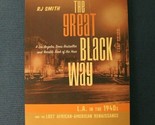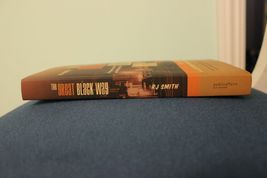Rendered at 17:50:07 11/25/25
Envío gratis
The Great Black Way: L.A. in the 1940s and the Last African American Renaissance
Los buques de
United States

Share & earn! Sign in, share this or any listing, and you’ll get commission when it sells.
Learn more
Las opciones de envío
No hay precio de envío se especifica en MX
Los buques de
United States

Política de oferta
OBO - El vendedor acepta ofertas en este artículo.
Detalles
La política de devoluciones
Protección de compra
Opciones de pago
PayPal accepted
PayPal Credit accepted
Venmo accepted
PayPal, MasterCard, Visa, Discover, and American Express accepted
Maestro accepted
Amazon Pay accepted
Nuvei accepted
Las opciones de envío
No hay precio de envío se especifica en MX
Los buques de
United States

Política de oferta
OBO - El vendedor acepta ofertas en este artículo.
Detalles
La política de devoluciones
Protección de compra
Opciones de pago
PayPal accepted
PayPal Credit accepted
Venmo accepted
PayPal, MasterCard, Visa, Discover, and American Express accepted
Maestro accepted
Amazon Pay accepted
Nuvei accepted
Rasgos del artículo
| Categoría: | |
|---|---|
| cantidad disponible: |
Sólo uno en stock, para muy pronto |
| Condition: |
Brand New |
| ISBN: |
9781586485214 |
| Author: |
R. J. Smith |
| Book Title: | |
| Language: |
English |
| Topic: | |
| Format: |
Perfect |
| Publisher: |
Public Affairs |
| Genre: |
Social Science, Biography & Autobiography, History |
| Publication Year: |
2007 |
| Illustrator: |
Yes |
| Era: |
1940s |
| Literary Movement: |
Renaissance |
| Item Height: |
1 in |
| Item Length: |
9 in |
| Item Weight: |
15.9 Oz |
| Item Width: |
5.7 in |
| Number of Pages: |
400 Pages |
| Regional Cuisine: |
American |
| EAN: |
9781586485214 |
Detalles del anuncio
| Envío de descuento: |
Vendedor paga el envío para este artículo. |
|---|---|
| Precio de descuento: |
10% De descuento w / $50.00 pasó |
| Publicado en venta: |
Más de una semana |
| Artículo número: |
1690163039 |
Descripción del Artículo
This is a paperback book. Please review the pictures as you will get what you see :)
This book is not marked and in original condition. Please do not hesitate to reach out to me if you have any questions regarding this book or this listing.
About the Author: RJ Smith is a senior editor at Los Angeles Magazine. He was a columnist for The Village Voice, a senior contributing editor at Details, and a staff writer for Spin, and has written for major magazines including The New York Times Magazine, GQ, and Rolling Stone. His research for The Great Black Way was underwritten by the Getty Research Institute and by USC's Center for Transnational and Multiethnic Studies. Born in Detroit, Michigan, Smith now lives in L.A.
This book, like a major archaeological dig, unearths a littleknown, now vanished civilization and changes how we understand history. In the 1940s, when FDR opened up the defense industry to black workers, it inspired a massive wave of black migration to a small area of Los Angeles along Central Avenue?and cultural ferment in the arts, culture, and politics. In a neighborhood densely packed with black musicians, independent labels and after hours spots, rhythm and blues was spawned. Chester Himes fathered the black detective novel and a noir sensibility. Black comics took off minstrel blackface for the first time and addressed audiences directly with socially-tinged humor. And, Smith suggests, the civil rights movement helped get its start, as the strategy of building mass movements and giving power to ghetto dwellers gained favor in opposition to the top-down strategies of the NAACP and the Urban League. Harlem's Renaissance had been driven by the intellectual elite. In L.A., a new sense of black identity arose from street level. But when the moment was over, many hopes and lives were swept away with it. Based on original research and interviews, told through an engaging narrative, this book shows convincingly that much that we take for granted today, from hip hop and slang to modern-day street fashion, all flowed from the 1940s scene along the Great Black Way.
Added to your wish list!

- The Great Black Way: L.A. in the 1940s and the Last African American Renaissance
- 1 in stock
- Price negotiable
Get an item reminder
We'll email you a link to your item now and follow up with a single reminder (if you'd like one). That's it! No spam, no hassle.
Already have an account?
Log in and add this item to your wish list.








